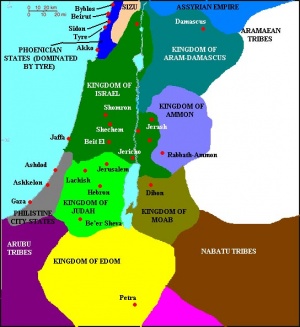Ancient Israel and Judah
Synopsis: The history of the Israelites is a story of God's promises and steadfast love. It begins when God chose Abraham to go into the land of Canaan. The descendents of Abraham later became slaves in Egypt, but Moses delivered them out of slavery and back to the land God had promised. The people of Israel were initially rules by judges and later kings, the most famous being David. Time and time again the people turned away from God, only to be forgiven. Eventually however, the kingdom of Israel split in civil war into the northern kingdom of Israel and the southern kingdom of Judah. Both fell to invading armies and the people of Israel were exiled to foreign lands. Some returned and rebuilt the temple in Jerusalem, but remained under foreign rule. The Romans controlled the area of Palestine at the time of Jesus, who came to restore God's kingdom - but not in the way people of the time expected - he restored us to a right relationship with God.
Contents
Related topics
- Hebrew
- Characters of the Bible
- Patriarchs
- Exodus | Promised Land
- Judges
- Kings of Israel Index | King Saul | King David | Solomon
- Kingdom of Judah | Kingdom of Israel
- The Exile
Comments, Personal Articles, Studies and Sermons
Ancient Israel and Judah (discussion) (For short comments and opinions)
Main article
The history of the Israelites is a story of God's promises and steadfast love. It begins when God chose Abraham to go into the land of Canaan. The descendents of Abraham later became slaves in Egypt, but Moses delivered them out of slavery and back to the land God had promised. The people of Israel were initially rules by judges and later kings, the most famous being David. Time and time again the people turned away from God, only to be forgiven. Eventually however, the kingdom of Israel split in civil war into the northern kingdom of Israel and the southern kingdom of Judah. Both fell to invading armies and the people of Israel were exiled to foreign lands. Some returned and rebuilt the temple in Jerusalem, but remained under foreign rule. The Romans controlled the area of Palestine at the time of Jesus, who came to restore God's kingdom - but not in the way people of the time expected - he restored us to a right relationship with God.
Patriarchs
The patriarchal period begins with Abraham (Abram), who lived around the 1,800 BC. The life of Abraham is recorded in the Book of Genesis. According to Genesis, God called Abram to faith and obedience, calling him to leave his home of Ur, and move to a land that He would show him. Abram, his wife Sarai (Sarah), and his extended clan then moved to the land of Canaan. In this land, God promised to bless him and make him a great nation (although Abraham was childless at the time). Trusting this promise, Abram journeyed down to Shechem, then to a spot between Bethel and Ai. He then moved to the oaks of Mamre in Hebron. The Bible tells us that Abraham trusted God, and God credited this to him as righteousness. Abraham's wife, Sarah, bore a son, Isaac, late in life. Isaac was the father of Jacob, who God renamed Israel. Jacob was the father of 12 sons, whose offspring became the 12 tribes of Israel.
Slavery in Egypt
Wandering
Conquest of Canaan
Judges
United Monarchy
Divided Monarchy
Following the death of King Solomon, the kingdom of Israel underwent a schism. This is described in 1 Kings 12. The remainder of the book 1 Kings and all of the book 2 Kings describes the history of Israel during this period of a divided kingdom. It explains from a theological view the political developments that occurred in this time. Both kingdoms progressively lost sight of God and began to follow pagan gods.
There was especially rapid decline into polytheism in the northern kingdom, ultimately resulting in God's judgement against the kingdom with the invasion of the Assyrian army and the deportation of the people, who ceased to exist in history as an independent culture or people.
In the southern kingdom of Judah, the decline was slower, with certain kings, such as Hezekiah and Josiah, refocussing the nation on God. Ultimately however the southern kingdom also received God's judgement for their abandonment of him in place of other gods, and the kingdom was invaded by the Babylonian army and the people deported to Babylon. The Jews of the southern kingdom however maintained their identity and culture and so did not cease to exist in history.
During this period, there was intense prophetic activity with prophets such as Isaiah and Jeremiah calling the people back to God.
Below is a table showing the kings of the two kingdoms during this period, with estimated dates of when the kings ruled.
| King of Judah (Estimated Dates BC) | King of Israel (Estimated Dates BC) |
|---|---|
| Rehoboam (931-913) | Jeroboam I (931-910) |
| Abijam (913-911) | |
| Asa (911-870) | Nadab (910-909) |
| Baasha (909-886) | |
| Elah (886-885) | |
| Zimri (885) | |
| Omri (885-874) | |
| Ahab (874-853) | |
| Jehoshaphat (870-848) | Ahaziah of Israel (853-852) |
| Joram (852-841) | |
| Jehoram (848-841) | |
| Ahaziah of Judah (841) | Jehu (841-814) |
| Athaliah (841-835) | |
| Jehoash of Judah (835-796) | Jehoahaz of Israel (814-798) |
| Jehoash of Israel (798-782) | |
| Amaziah (796-767) | Jeroboam II (782-753) |
| Uzziah (767-740) | Zachariah (753) |
| Shallum (752) | |
| Menahem (752-742) | |
| Pekahiah (742-740) | |
| Jotham (740-732) | Pekah (740-732) |
| Ahaz (732-716) | Hoshea (732-722) |
| Hezekiah (716-687) | |
| Manasseh (687-643) | |
| Amon (643-641) | |
| Josiah (641-609) | |
| Jehoahaz of Judah (609) | |
| Jehoiakim (609-598) | |
| Jeconiah (598-597) | |
| Zedekiah (597-587) |
Captivity - Exile
In 722 BC the Northern Kingdom of Israel was conquered by the Assyrian Empire. Its people were moved en masse by the Assyrians into neighbouring territories, and people of other conquered nations moved into the land to fill the void. The Jews of the northern Kingdom assimilated into their new lands, and these tribes of Israel disappeared from history as a distinct people forever. The account is explained in 2 Kings 17 as a judgement against the people of the the northern Kingdom for repeated and continued unfaithfulness to God.
- Template:2 Kings 17:6 (WEB) edit
- Template:2 Kings 17:7 (WEB) edit
- Template:2 Kings 17:8 (WEB) edit
- Template:2 Kings 17:9 (WEB) edit
- Template:2 Kings 17:10 (WEB) edit
Rebuilding the Temple
Roman Occupation
Quotes
Links
Return to Old Testament | Church history
Note to users: The wiki is currently operating in safe mode. Editing is limited to users with certain privileges in order to deal with spam. You can create a new user account, and confirm your email ID in order to obtain ability to edit pages. Learn how to be an editor or sysop at WikiChristian.
- Sister projects: WikiMD.com Wellness Encyclopedia & Directory
- Sponsors: WikiChristian is supported by W8MD's medical weight loss and sleep centers.


